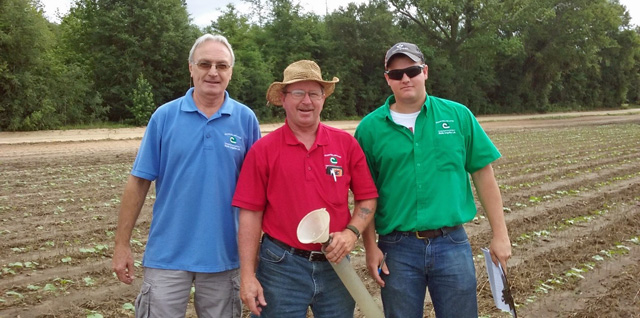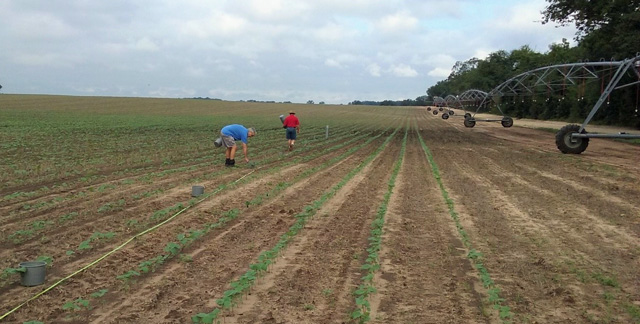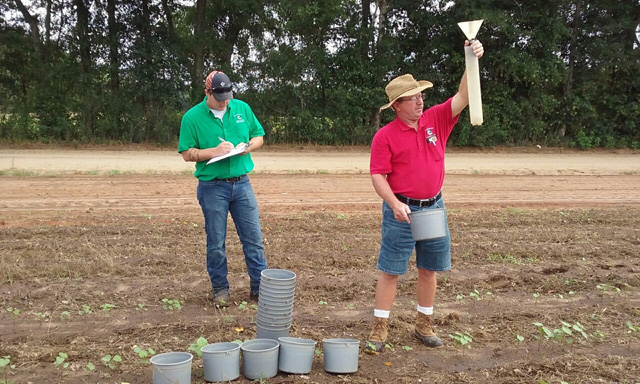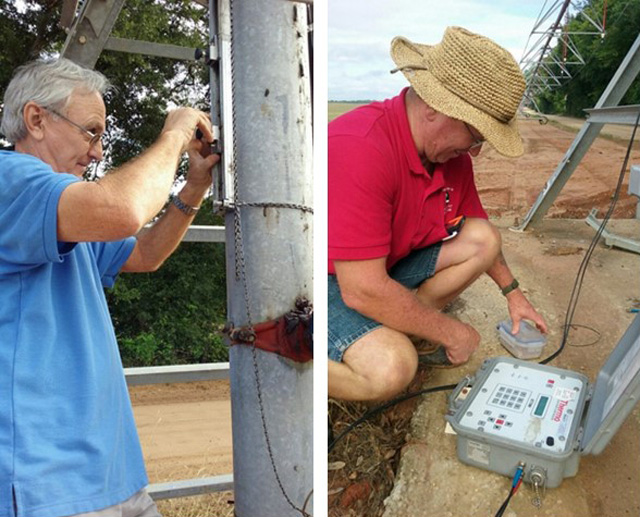
The Northwest Florida Mobile Irrigation Lab Team, from left to right: Mark Miles, Rex Patterson, and Robert Patterson
The Northwest Florida Mobile Irrigation Lab
Northwest Florida’s Mobile Irrigation Lab (MIL), run by Mark Miles, Rex Patterson, and Robert Patterson, is working hard to help farmers increase crop yields and lower costs through improved irrigation efficiency. By increasing efficiency, farmers can reduce operating costs and increase yields. The MIL has been providing free irrigation evaluations in row crop systems since 2005, and has completed more than 1,000 evaluations across the Panhandle, from Escambia to Jefferson County.
Not only are these irrigation assessments good for a farmer’s bottom line, but they are a highly effective way to help conserve Florida’s water resources. The Northwest Florida Water Management District (NWFWMD) estimates that the MIL evaluations have resulted in a savings of more than 9.25 million gallons of water per day, totaling more than 2.5 billion gallons groundwater saved to date. The MIL is funded by the Florida Department of Agriculture and Consumer Services (FDACS), the USDA Natural Resources Conservation Service (NRCS) and the NWFWMD.

The team places a water collection bucket every 20 meters in a straight line along the path of the center pivot to capture irrigated water. Once the buckets are in place, the pivot is turned on and starts moving across the field.
Why are these evaluations important and how are they done?
The MIL wants to make sure that a farmer’s irrigation system is running at maximum efficiency, and a major part of this is making sure that the center pivot distributes water evenly across the field. If not, some plants receive less water than others, and farmers have to increase the amount of water applied to make sure all plants get enough. In areas that are over-watered, fertilizers can move past the crop’s root zone into the aquifer system. These nutrients are no longer available for plants to use, and they contaminate our water resources. By fixing distribution problems, farmers reduce the amount of water used and operating costs are lowered – less fertilizer is wasted and pumping costs (electricity or fuel costs) are reduced.

When the pivot has moved past the buckets, Rex Patterson measures the content of each one while Robert Patterson records the data. This will let the team know how evenly the pivot system is distributing water in the field.
During an MIL evaluation, the team will go through the entire irrigation system to evaluate how effectively it is running. This includes testing the center pivot’s distribution uniformity (how evenly water is applied to plants in the field), the application rate, pivot speed, water pressure, water flow rate and checking for leaks. The MIL analyzes this information and prepares a confidential report for the farmer. Recommendations to improve efficiency can include replacing sprinklers, fixing leaks and end gun adjustments, among others. Farmers can have an evaluation done every three years.

Mark Miles (left) places the flow meter on the center pivot’s pipe stand and Rex Patterson (right) waits for the system to pressurize before checking the water’s flow rate on the meter’s console.
How do you schedule an irrigation evaluation for your farm?
To schedule an appointment with the Northwest Florida Mobile Irrigation Lab, call: (850) 482-0388; Fax: (850) 463-8618. Their offices are located on 4155 Hollis Drive, Marianna, FL 32448.
If your farm is outside the Panhandle, us the following FDACS website to contact the MIL that serves your area: MILs in Florida. There are currently 14 MILs providing services in 62 counties across the state.
Cost-share funds for irrigation management
FDACS, the USDA-Natural Resources Conservation Service (NRCS) and the water management districts offer cost-share funds for irrigation management, which includes irrigation system enhancements and conversions, end gun control and pump bowl upgrades among others. Contact your local FDACS field staff, NRCS office and water management district for more information on available cost-shares and funding deadlines. This information can be found on the following websites:
-
FDACS Office of Ag Water Policy Staff
-
NRCS Staff Serving the Panhandle
-
Northwest Florida Water Management District BMP Program for Jackson Blue Springs
- Private Well and Water Quality Workshop – April 11 - March 15, 2024
- The Granberry Farm: Sustainably Managing a Cattle Ranch in the Chipola River Basin - January 5, 2024
- Farmers Working Together to Integrate Crop and Livestock Production - June 16, 2023
